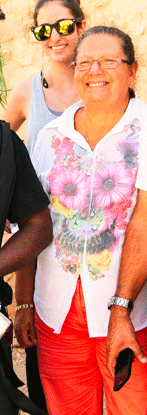

FEASTS
Don't miss THE THREE SOLEMN FEASTS !
PASSOVER/FEAST OF UNLEAVENED BREAD
Passover
Passover is the set apart and joyous festival that commemorates Israel’s deliverance from bondage in Egypt. The Israelites cried out to HWHY in their oppression, and HWHY sent Moshe to deliver them. But Pharaoh refused to let our forefathers go, so HWHY told Moshe He would strike every Egyptian home with the death of the firstborn. The Israelites captives were also told to eat the sacrificial lamb in haste as they prepared to leave Egypt in the first Exodus As our forefathers we will keep the feast as commanded and the ordinances. Many people teach that this feast is done away, that we should not keep torah by returning to Zion or this feast can be kept outside the land. You can never find one of the 3 feast kept outside of Jerusalem. Now that Jerusalem has been discovered we are ordered by the Mashyach and HWHY to return to Torah and repent of our wicked ways and that the Torah as the Mashyach is never done away. Mathew 5:17-21. We are in mourning so were asking our people to wear black as the customs of the Hebrews when they were mourning.
PASSOVER image archivE
Lamb Eating The Leaven Passover 2017
Buying of The Passover Lamb 2017
Exodus 12:15
'Seven days you shall eat unleavened bread, but on the first day you shall remove leaven from your houses; for whoever eats anything leavened from the first day until the seventh day, that person shall be cut off from Israel.
The Feast of Unleavened Bread is a feast that is generally mistaken for Passover. Passover however is only one 24 hour period while Feast of Unleavened Bread lasts for seven days.
On the evening after Passover God told the Hebrew people exiting Egypt not to allow their bread to rise, but to grab everything and leave. The ancient peoples used to gather yeast on grape leaves to leaven their bread if they needed to speed up the process, but God said "Don't even let any leavening touch the dough. Just bake it and go."
In their haste they grabbed the necessities and fled toward the land God was preparing for them.
God then told them that in the future they were to commemorate this feast by getting all yeast out of the house for seven days.
FEAST OF UNLEAVENED BREAD
image archivE
FEAST OF OF WEEKS
Shavuot has a double significance. It marks the all-important wheat harvest in the Land of Israel ; and it commemorates the anniversary of the day God gave the Torah to the entire nation of Israel assembled at Mount Sinai, although the association between the giving of the Torah (Matan Torah) and Shavuot is not explicit in the Biblical text.
The holiday is one of the Shalosh Regalim, the three Biblical pilgrimage festivals. It marks the conclusion of the Counting of the Omer, and its date is directly linked to that of Passover. The Torah mandates the seven-week Counting of the Omer, beginning on the second day of Passover, to be immediately followed by Shavuot. This counting of days and weeks is understood to express anticipation and desire for the giving of the Torah. On Passover, the people of Israel were freed from their enslavement to Pharaoh; on Shavuot they were given the Torah and became a nation committed to serving God.[2]The word Shavuot means weeks, and the festival of Shavuot marks the completion of the seven-week counting period between Passover and Shavuot.
PENTECOST image archivE
FEAST OF TABERNACLES
Like Passover and Shavu'ot, Sukkot has a dual significance: historical and agricultural. The holiday commemorates the forty-year period during which the children of Israel were wandering in the desert, living in temporary shelters. Sukkot is also a harvest festival, and is sometimes referred to as Chag HaAsif, the Festival of Ingathering. The festival of Sukkot is instituted in (Leviticus 23:33) (Nehamiah 8) (Book of Jub 16 seq. No work is permitted on the first and second days of the holiday. In honor of the holiday's historical significance, we are commanded to dwell in temporary shelters, as our ancestors did in the wilderness. The commandment to "dwell" in a sukkah can be fulfilled by simply eating all of one's meals there; however, if the weather, climate, and one's health permit, one should live in the sukkah as much as possible, including sleeping in it.
What are the procedures for each festival? Tabernacles is indeed the last of the appointed feasts and concludes the festive calendar. As such, it anticipates the culmination of God’s purpose for Israel, the final fulfilment of God’s promises for and through that nation. To emphasise perfection and completion, it occurs in the seventh month, lasts for seven days and the number of its sacrifices are divisible by seven. Whereas the sacred number seven appeared at the Feast of Unleavened Bread only in the number of its days, and at Pentecost in the period [which must transpire before] its observance (7x7 days after Passover), the Feast of Tabernacles lasted seven days, took place when the seventh month was at its full height, and had the number seven impressed on its characteristic sacrifices.
FEAST OF TABERNACLES image archivE
The
Half Shekel
According to the Torah every man over the age of twenty should bring a half shekel to the tabernacle and be numbered on the 8th day of Unleavened Bread,Tabernacles and of Pentecost its done the same day of the feast. We do this every 3 feast according to what is written in Torah we do not add or subtract. This is how you and everyman will be sealed by the Allahiem of Israel until there are 144,000 of male Israelites appearing in Zion before the return of Ha Mashyach.


























































































